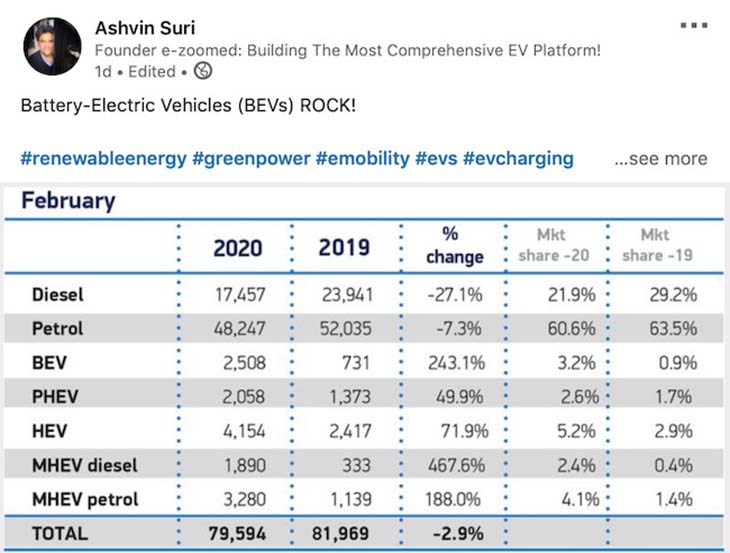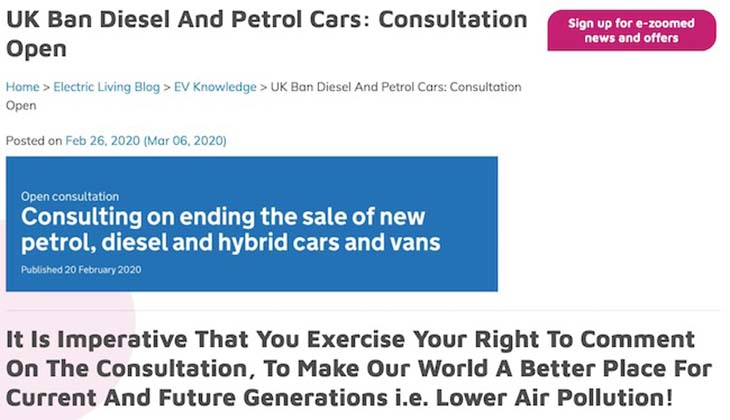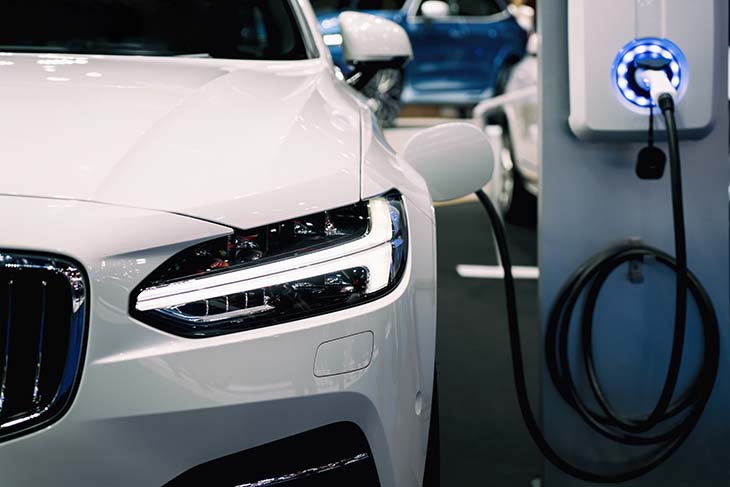
Author - Ashvin Suri, Founder of E-Zoomed, a Creditplus partner: Ashvin has been involved with the renewables, energy efficiency and infrastructure sectors since 2006.
He is passionate about the transition to a low-carbon economy and electric transportation. Prior to that he was an investment banker with JPMorgan. He was awarded an MBA from the London Business School in 1998.
2020 has commenced with a big bang for BEVs. Recently released new car registration figures from the SMMT prove just that.
Registrations of battery-electric vehicles (BEVs) are up an astounding 243% in February 2020, compared to February 2019.
We expect this trend to continue uninterrupted for the foreseeable future, as we migrate from internal combustion engine (ICE) petrol and diesel cars to emission-free electric vehicles.

The UK government has continued to show its support and leadership for zero-emission road transportation.
In February 2020, the government announced a consultation process for moving forward the ban on ICE vehicles to 2035, but potentially 2032.
The consultation process is ongoing and we at e-zoomed strongly encourage members of the public to send in their views.
Bottom-line, the sooner we can migrate to pure electric cars, the sooner we can reduce air pollution and mitigate the risk of climate change.

2020 has also commenced with a significant increase in enquiries from potential EV buyers and incumbent electric car owners looking to upgrade their EVs.
The latest line-up of battery-electric vehicles has both inspired and instilled confidence in potential buyers.
A WLTP zero-emission electric driving range of 200 miles is now standard, with some pure electric cars crossing 300 miles.
We expect a continued improvement in the performance and range of electric car batteries going forward.
It is also clear that automotive manufacturers have adopted one of the two key design and development strategies.
Some are focusing on the urban driver that has shorter commuting distances. The Honda-e is a good example of an electric car focusing on the urban car owner.
Such EVs have a smaller battery pack and in the case of the Honda-e, it is 35.5 kWh The other predominant strategy are EVs focusing on increased range performance.
The Tesla Model 3 is a good example of this approach. The pure electric car can achieve an emission-free range of up to 348 miles (WLTP) perfect for long-distance drives!
The current line-up of Concept and Production Electric Cars are certainly awe-inspiring, and this is only the start. Other themes continuing to gain traction in support of mass-scale EV adoption include:
1) Increased Local Level Legislation
In November 2019, Bristol announced that it would ban privately owned diesel vehicles from the city center.
Leeds city council also followed suit to ban diesel vehicles. We at e-zoomed applaud their leadership and certainly expect many more cities to follow in 2020, as improving air quality moves to the top of the agenda!
2) Change In Consumer Perceptions
As mentioned above, the increased confidence in the latest line-up of pure electric car has resulted in reducing fears over range anxiety.
Moreover, with the broader increase in awareness on climate change, consumers are keener than ever before to make ethical choices in purchase decisions.
Buying a car is one of the biggest decisions made by households, and families across the country are recognizing the importance of moving rapidly to emission-free transportation.
The demand for electric cars is certainly more than current supply. By way of example, the all-electric Volkswagen ID.3 car sold out in two days!

However, Key Challenges Remain
Despite the positive progress in the UK electric vehicle market, significant challenges remain to achieve large-scale adoption. Some of these include:
- Plug-In Car Grant
The continued ambiguity over the UK government plug-in car grant (PiCG) incentive. We at e-zoomed have been vocal in our expectations to see the government institute a clear, unambiguous, stable and long-term incentive framework for zero-emission electric cars.
Affordability still remains a key obstacle to mass-market adoption. We encourage the UK government to continue with the current PiCG incentive for at least another 24 months.
- Supply Chain Stability and Maturity
The EV value chain in regards to the supply of key components like EV battery is still very fragile. The recent halt of the production of the all-electric Audi e-tron, highlights the current risks inherent in the supply chain.
To achieve large-scale migration to EVs, we need stable supply to achieve higher production volumes. Otherwise mass migration to EVs will remain just a dream.
- Charging Infrastructure
Despite the decrease in concern over range, potential and current EV buyers seek convenience and speed in relation to charging.
There is no doubt that public charging infrastructure in the UK has increased rapidly over the past 24 months.
However, we urge the government to further support the deployment of rapid charging points, in particular in cities where access to a private garage or driveway is not common.
For residents of populated cities, like London, easy accessible and rapid charging infrastructure will be a prerequisite to migrate to all-electric cars.
There is no doubt, in that, 2020 and beyond will continue to be very strong years for the UK (and global) EV market.
If automotive companies can deliver on production volumes, demand will be potentially significantly higher than currently projections by market participants.
On a final note, if you have not tried an EV, then you must make it a priority. We recommend you rent one for a few days, to include a weekend emission-free getaway with the family. You will never look back!
Get EV finance today
With Creditplus' choice of flexible finance options, you can spread the cost of an electric vehicle across affordable monthly payments. Check your eligibility for EV finance today, without impacting your credit score.





 Facebook
Facebook Twitter
Twitter Instagram
Instagram LinkedIn
LinkedIn Youtube
Youtube